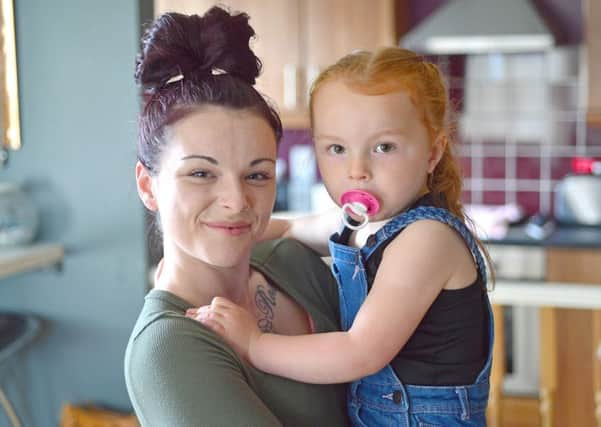Rathcoole family benefitting from '˜fantastic' new support programme


Brain Injury Matters has worked with the Belfast Health and Social Care Trust to adapt and deliver an internationally recognised programme of support which aims to intervene early to minimise the risk of long term difficulties after brain injury.
The Family First programme, which is funded by the Big Lottery, aims to help families throughout Northern Ireland deal with the significant challenges which can occur when a child sustains a brain injury.
Advertisement
Hide AdAdvertisement
Hide AdIt’s estimated that up to 1,000 children in Northern Ireland suffer a traumatic brain injury every year.
“There are a number of ways in which a child can acquire a brain injury,” explained Dr Katy Pedlow, Project Co-ordinator of the Family First programme.
“It could be due to meningitis, a stroke, a brain tumour, an accident or various other causes.
“For some children, acquired brain injury can bring major changes in their mobility, their behaviour and their ability to integrate into the school system.
Advertisement
Hide AdAdvertisement
Hide Ad“That’s a significant shock for many families; they often struggle to adjust and feel really overwhelmed.
“The Family First programme provides a set of therapeutic and practical tools which families can use to help to them find solutions to the problems they face.”
One family which has been supported by Family First is the Dumigan family from Rathcoole.
Little Harley Dumigan (3) suffered a brain injury as the result of a stroke when she was just two-and-a-half years old. For both Harley and her mum, Bo, it was a life-changing event.
Advertisement
Hide AdAdvertisement
Hide Ad“Harley’s stroke had a huge impact on her mobility, her ability to perform simple tasks and her personality,” said Bo.
“I’ve had to go back to changing nappies, dressing her, washing her and looking after her very intensively – it’s like having a new-born baby all over again, to be honest.
“And, while she used to be very sweet-natured, she now gets frustrated very easily, which does require a lot of patience to deal with.”
The Family First team has provided a range of practical and emotional support for Harley and Bo, including strategies for helping to manage Harley’s frustration, and techniques to help Bo cope with her anxiety that Harley might have another stroke.
Advertisement
Hide AdAdvertisement
Hide AdBo says she is absolutely delighted with the support provided by Family First.
“When Harley came back home after two months in hospital, I suddenly realised ‘That’s it – we’re on our own now’,” she recalled.
“Harley does still attend the hospital for check-ups, but the doctors and nurses are very busy people, and they can’t be there for you every time you’re finding it difficult.
“That’s why Family First has been so fantastic. You feel they really understand what it’s like for you and they’ll go the extra mile to provide support. It’s made such a difference. I can’t thank them enough.”
Advertisement
Hide AdAdvertisement
Hide AdThe approach being used by the Family First programme was originally developed in Northern Ireland to help people cope with other health conditions; this is the first time it’s been employed in relation to acquired brain injury.
Brain Injury Matters hopes that the innovative techniques and holistic support which Family First is providing will eventually be taken up by health trusts and other relevant services.
“By empowering families to recognise and solve problems for themselves, the Family First programme is helping to prevent many of those families from reaching crisis point,” explained Dr Pedlow.
“We certainly believe that our approach has the potential to transform the support which families affected by brain injury receive and, by preventing crises from arising in the first place, it also has the potential to help the health service to save money in the future.”
Advertisement
Hide AdAdvertisement
Hide Ad• If you have a child with acquired brain injury or you know a family who might benefit from the Family First service, contact the Family First team on 028 9070 5125, or email [email protected]